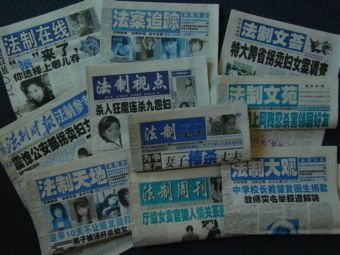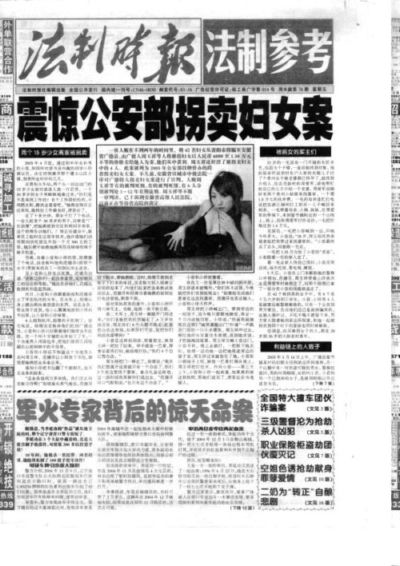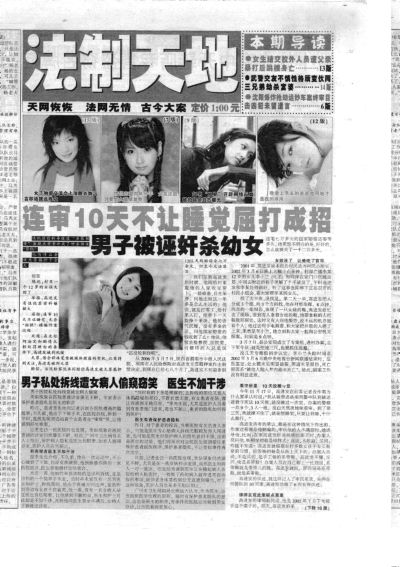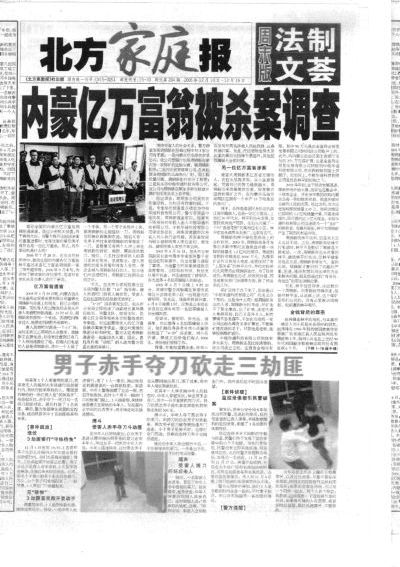What does a bribery case involving a hospital director in the Chinese city of Changde have to do with Hollywood actress Demi Moore? Absolutely nothing. But a perplexing mixture of pilfered Web photos and sensational law and order content smash the two together on a recent issue of Legal News Compendium (法制文荟), one of many “law and order” tabloids now available at newsstands in China. The tabloids, most of which appear to be fronts for soft pornography, provide an interesting glimpse into the dirty bargain basement of Chinese media commercialization. [BELOW: Legal tabloids sold at a newsstand in Shanghai, See PDF for larger image].

The growing popularity of “law and order” tabloids follows a general trend in Chinese media. “COPS”-style television shows are all the rage on local and national television in China, stealing the ratings thunder from once popular news programs like China Central Television’s “News Probe”. The shows generally receive the support of local police, who see them as a good opportunity to advertise their efforts to combat China’s growing public safety problem. For the first time this year “public security” rose to the top of the list of concerns voiced by officials in a survey conducted by the Central Party School [link to Chinese news here].
The explosion in law and order related programming has already brought tension between the policy goal of educating the general population about the law and the government’s efforts to keep a lid on sensational or indecent content.
In late November national media announced the release by the propaganda department of a “Decision” calling for strengthening of legal education among the general population. Officials said at a forum on law and order programming in late November that to “promote the legal system and realize its use in protecting social harmony [China] must strengthen publicity work and education for the legal system and propagate legal knowledge”.
But China’s top broadcast regulator, the State Administration of Radio Film and Television (SARFT), made it clear on November 20 this year that law and order programs would have to tone down their content. SARFT said it would reign in programs showing violent or explicit content, or that leaked facts about critical cases.
Browsing a newsstand in Shanghai last week, CMP found 10 “law and order” tabloids that seem to be riding the wave of interest in good-guys-bad-guys stories — and giving their circulations an extra boost with salacious content. All of the tabloids sell for just one yuan. All have blue banners and are called “Legal” (法制) something or other: Legal Viewpoint (法制视点), Legal Weekly (法制周刊), Legal Spectacle (法制大观), Legal Life (法制生活). Only three have the required publishing license numbers on display on their front pages, but some have licenses for unrelated publications listed inside. The papers cover a range of legal cases and information apparently from police blotters.
The top story in the Changde (Demi Moore) issue of Legal News Compendium is about the busting up in 2005 of a crime ring selling Chinese women across provinces [Internet photo of Moore used by the paper here]. There are no datelines or bylines for any of the stories, suggesting they might be robbed from other media. However, CMP could not locate coverage of any of the front page stories in Legal News Compendium in a database of Chinese newspapers going back to the late 1990s. Other stories in the issue include:
*A man jailed 10 days for writing a poem on the Great Wall
*A purse snatcher nabbed after hiding out in a public toilet
*A man “tricking” his girlfriend into becoming a prostitute
*A man severely beaten “over a cigarette” . . .
The Legal News Compendium is far and away the tamest of the bunch. Slightly farther along the sleeze scale is Legal Times (法制时报), which sprinkles prurient images of women among its crime reports. The front page story is identical to that of Legal News Compendium, about a crime ring selling women. This time, though, there is an image at center of a young woman lying on a sofa in her nightgown. The source of the photo has been photoshopped away and the words “photo and text not related” added. This newspaper is the only one to bother pointing out the obvious to readers [BELOW: Image of Legal Times].

Flip through the pages of Legal Times and you get the usual crime stories with the occasional leering woman and advertisements for sex hotlines crowding together at the bottom of each page.
At Legal World (法制时报) the marriage of sex and the crime story makes it more boldly to the front page. Photos of women beneath the banner refer readers to unrelated law and order stories on the inside. On the inside pages, once again, sultry personals and ads for sex hotlines. [BELOW: Image of Legal World].

The rest of the tabloid “law and order” newspapers follow the same model of crime content allied with sex. The only other characteristic worthy of note is how these newspapers make use of their publishing licenses.
Returning to the Legal News Compendium, there is no license number listed on the front page. But the title “Northern Family Newspaper” (北方家庭报) appears in small vertical characters beside the larger title. Turn to the center spread and a larger banner for “Northern Family Newspaper” appears, this time with the date (December 10) and the publishing license number (CN15-0051). It’s as though the paper is reversible, so that it can be turned inside out from the center to display its legitimate publisher. Needless to say, the paper is hardly offering family-oriented content.
The same is true of the Legal Spectacle (法制大观), whose center spread has an additional banner for Science and Technology News (科技信息报), apparently the tabloid’s sponsoring institution (主管单位), and the license number (CN15-0047). [BELOW: Image of center of Legal News Compendium with banner at top for “Northern Family Newspaper”]

[Posted by David Bandurski, December 20, 2006, 5:03pm]




















